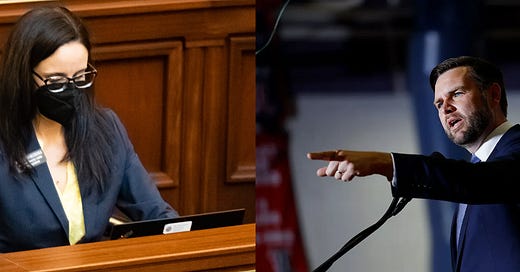Last month, the director of the Idaho Dept. of Health and Welfare (DHW) informed the co-chairs of the Joint Finance-Appropriations Committee (JFAC) that the Idaho Child Care Program (ICCP) would be more than $15 million over budget this fiscal year.
As I reported at the time, ICCP is funded by federal grants distributed under the Child Care and Development Block Grant (CCDBG), which was initially signed into law by President George H.W. Bush in 1990. The program has been expanded numerous times, most recently to the tune of $15 billion by President Joe Biden.
Typically when a state agency goes over budget, its director comes to JFAC, hat in hand, to beg for extra money, which is called a supplement. However, DHW director Alex Adams chose instead to tighten the program’s belt to live within its means. He ordered a return to pre-2021 thresholds for who is eligible for the program as well as what level of childcare is subsidized.
Idaho Democrats have seized upon this budget overrun to accuse Republicans of hating children and families, as usual. Idaho Democratic Party chairwoman Lauren Necochea published a column excoriating Republicans and demanding that the Legislature release $50 million in unspent funds to close the budget gap.
Is that such a bad idea? After all, the money is already there, and it all comes from the federal government anyway, so why not use it to continue subsidizing needy families? Idaho Freedom Foundation (IFF) policy director Niklas Kleinworth broke down why it’s not a good idea in this week’s Fiscal Fridays:
Republican vice presidential candidate J.D. Vance addressed the CCDBG on Twitter earlier this week. Responding to a woman who claimed that he “inaccurately defines the problems families face, he offers solutions that make no sense,” Vance wrote:
1) Many don't fully appreciate how federal (and state) policy penalizes particular family models--particularly in-home care and kinship care--over others. That's true of the Child Care Development Block Grant and the Dependent Care Tax Credit, though in different ways for each. So yes, parents or grandparents might not be able to help, but they might *want* to, and for those families federal policy should not be forcing one particular family model. We should try to encourage whatever is best for each individual family. Right now we don't: we try to force or at least subsidize one model on every family in this country. And if you open up kinship and other options for families, you will relieve some pressure on the daycare system in this country.
2) If you subsidize something but don't increase the supply of it, you're going to raise prices without getting an increase in quality. This is what's so broken about Kamala Harris's approach to child care. You can't just write a check if there aren't additional providers. So while I obviously support health and safety regulations, there are some absurd regulations out there that restrict the supply of child care providers--from kinship providers to local churches. Just because the interests of the market are not always aligned with families--I agree and have said so myself!--doesn't mean that all government regulations make sense.
3) Finally, we have to consider the broken educational pathways that exist for a whole host of professions. A consistent thing I've heard is that there is great demand for a lot of jobs, but a totally broken pathway for young people to get into those jobs. It's true of plumbers and advanced manufacturing, but it's also true of child care providers.
In this response, Vance touched on something missing not only from the narrative of Idaho Democrats but also from the broader discourse on child care: the current system of subsidies nudges families toward corporate solutions rather than encouraging children to stay with grandparents or other relatives. Kleinworth’s suggestion to loosen regulations on the required ratio of staff to children is a step in the right direction, but perhaps it’s time to rethink how we view the entire child care ecosystem.
Ultimately, we must return to a society that allows and incentivizes mothers to stay home with their young children. Call me a misogynist if you want, but every possible metric shows that children do best when raised by their mothers and fathers rather than by teachers or child care staff, no matter how caring and competent those strangers may be. The entire child care industry exists as a symptom of a broken society. While we can and should work to improve it in the short term, we must keep in mind the long-term survival of our civilization.
As we consider solutions for families in Idaho, we should listen more to J.D. Vance than to Lauren Necochea. Simply dumping more money into the system is not a solution, either in the short term or the long term.




We definitely should incentivize in order: parents, kinfolk, and neighbors before subsidizing businesses to do childcare. Childcare tax credits that turn into cash subsidies only when the caregivers pay no taxes. But mothers who stay home would get the most.
Even those flexible spending accounts that cover daycare costs require a receipt for parents to be reimbursed. Should grandma need to create a business, document her time, report her "daycare" income, and provide a receipt for looking after grandbaby?